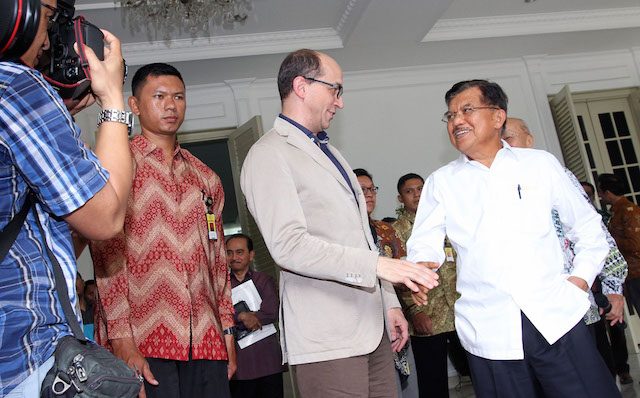SUMMARY
This is AI generated summarization, which may have errors. For context, always refer to the full article.

JAKARTA, Indonesia – Twitter’s Jakarta office has now officially been launched, and the first thing the microblogging site wants to do is to figure out a way to help Indonesia better respond to disasters.
During a media roundtable on Thursday, March 26, Twitter CEO Dick Costolo cited the company’s experience in the immediate aftermath of the April 2011 Fukushima earthquake and tsunami, when mobile telecommunications services were jammed.
“Twitter became a lifeline when people weren’t able to get through,” he said. “When that happened, we started working with the government there, and we started trying to reproduce that work around the world with governments and NGOs to make sure that Twitter can be used as an alternative emergency channel of communications when time is of the essence.”
That also seems to be what Indonesia wants Twitter to do. Communications and Information Minister Rudiantara said earlier this week that he wants to use Twitter technology for disaster information, such as early warning systems and spreading information on ongoing disasters. (READ: Tweet to map floods in Jakarta, and help save lives)
Expanding Twitter’s reach
But how do you do that in a country like Indonesia, where less than 30% of the population is online?
By bringing Twitter to feature phones.
“There are still so many billions of people on feature phones around the world, and we want to be able to bring the Twitter experience to people on those devices and with low bandwidth connections,” Costolo said.
In January, Twitter bought India-based startup ZipDial, which helps send information without data charges. It works by allowing users to make a missed call to certain numbers, and receive a call or a text message with information back from that number.
On Tuesday, March 24, Costolo launched its first service based on this technology in India. Called Samvad, it allows people to make missed calls to a number that would send back tweets from selected government officials and agencies, like the railway ministry, according to local media.
It’s this same ZipDial technology, Costolo said, that they want to bring to other markets like Indonesia.
Only about 25% of Indonesia’s cellphone users have smartphones. The rest are still on feature phones.
Not just disasters
Disasters aside, Twitter also wants to help more Indonesian girls become coders.
Costolo said they’re partnering with the University of Indonesia to create the #Twitter4WaniTek fellowship, which will fund every year for the next 3 years 5 scholarships covering tuition fees and living expenses for women to study computer sciences.
Twitter also has an ongoing partnership with Pulse Lab Jakarta, a United Nations project working with Indonesia’s National Development Planning Ministry (Bappenas), that is studying how real-time big data from Twitter can be mined to gain insights on pressing issues.
For instance, according to Anthea Webb, the UN Resident Coordinator for Indonesia, they can analyze what people are saying about immunization or about food prices. The idea is then to use this information help quickly inform government policy.
“It’s using data in ways we’ve never done before,” she said. – Rappler.com
Add a comment
How does this make you feel?





There are no comments yet. Add your comment to start the conversation.